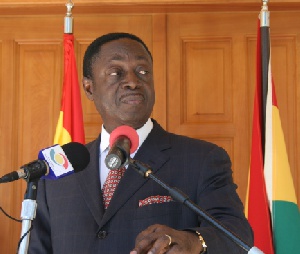Former Minister of Finance and Economic Planning, Dr. Kwabena Dufuor, seems to be telling the world that he is the best thing to have happened to Ghana's finance ministry.
With such posture, the otherwise fine gentleman is touting certain collective policies that were initiated under his tenure as his personal ideas and, without which nothing works.
In far away United Kingdom, Dr. Kwabena Dufuor was running his mouth about government's decision not to continue with hedging, which was implemented between 2010 and 2012.
Dr. Dufuor, who was speaking at the 2015 Natural Resource Governance Institute on the theme: 'Falling Prices, Risks', at St Catherine's College, Oxford, said that the hedging regime against unstable oil prices resulted in Ghana missing an opportunity to make millions.
However, records in Ghana indicate that the hedging programme did not stop immediately Dr. Dufuor left office; but rather continued until 2013.
In spite of the active implementation of the hedging programme in 2012, Ghana had one of the worst deficits, from which, the economy is still recovering.
The causes of the deficit included petroleum and other subsidies, as well as unpaid promissory notes and foreign exchange losses that should form part of a comprehensive assessment of a petroleum hedging programme.
This is contrary to Dr. Dufuor's claim that hedging during his time as finance minister contributed to one of the longest periods of monetary and fiscal stability in the history of Ghana.
The hedging programme was subjected to a review as government's broader review of the petroleum pricing formula and associated under-recoveries challenges in the downstream petroleum sector, including the foreign exchange losses claims, by the oil importers that was accepted and legitimized in 2012.
It is emerging also that the inter-ministerial technical team that conducted the review realized that the hedging programme at the time was fiscally unsustainable.
It is instructive to know that under the hedging period Dr. Dufuor was boasting about, option premiums were, either settled through issuing of bonds (thus increasing the deficit or debt stock) or through accumulated windfalls from end-period hedge settlement.
It was clear that such a situation could not be sustained and the objective of the review was to achieve consistent and sustainable source of funding.
However, for the purposes of mischief, some GH¢2.7 billion has been quoted as the money government has lost for not hedging. That same figure was quoted by Dr. Dufuor's Institute of Fiscal Studies (IFS) in April 2015.
The review of the hedging programme was concluded in September 2014, when Cabinet approved a set of recommendations to address challenges identified by the technical committee. These included the alignment of the hedge programme with the National Petroleum Authority's Price Build UP (PBU) and provision for hedging premiums within the mitigation account.
It is no secret that following the success of the review, the implementation of the hedging programme resumed.
However, government at the time decided to remain silent, as large hedging contracts are very sensitive to information; especially with regards to counterparties involved, government does not disclose the build-up of its hedge book.
In April 2015, Dufuor's IFS and IMANI came together to raise issues bordering on hedging, but had to recoil into their shells after government, through the Ministry of Finance, set the records straight.
At the time, those two institutes accused the current Finance Minister of causing financial loss to state, a situation which came out to be wholly untruth.
Again, the Director of the IFS, Professor Newman Kusi threatened to sue the finance minister, but has till today not been able to do so.
The position of Prof. Kusi at the time turned him into a laughing stock because the decision to review the hedging programme did not emanate from the minister, but rather, it was a Cabinet decision.
General News of Thursday, 9 July 2015
Source: The Inquisitor













